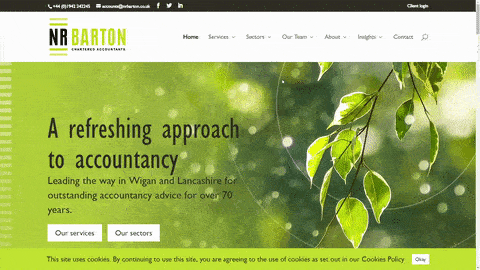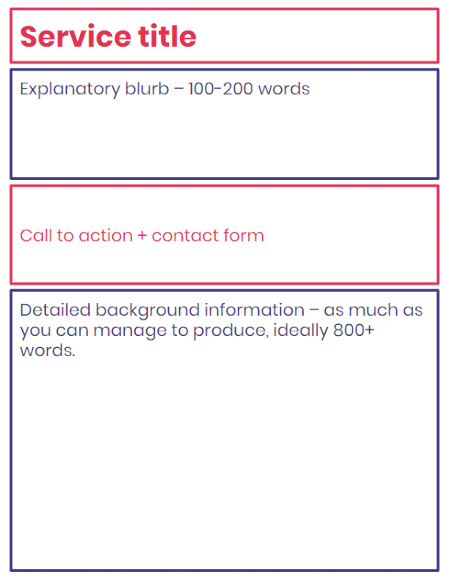When you’re commissioning a new website for your accountancy practice, it’s easy to end up focusing on the showy, brand-focused headline sections like the homepage or ‘about us’. But individual service pages matter, too. Massively.
As a senior account manager at PracticeWeb, I spend a lot of time working with our production team helping clients decide on the structure of new websites for accountants, with our in-house SEO expert, guiding them through adding new pages to improve their Google ranking through SEO strategy.
That means I’ve also spent a lot of time explaining to our clients what service pages are, what they’re for and the best ways to approach them.
This post is based on advice I’ve given over the past year or so since Horizon launched in 2018.
Service pages and search engines
If someone searches for ‘corporation tax return accountant Stevenage’ and you’re an accountancy firm in Stevenage that does corporation tax returns, you’ll want people to find your website.
You could just mention it in the text on your homepage and hope for the best.
Even better, though, is to have a page dedicated to that subject, with those words in the web address (URL) and with good, relevant copy.
Not only is Google more likely to rank your page, but users will get a more satisfying experience: a specific page that clearly relates to what they were searching and answers their questions is more likely to grab their attention.
Landing pages for pay-per-click (PPC) campaigns
If PPC is part of your marketing mix you’ll need somewhere on your website for people who click through from adverts anywhere on the web to land.
In an ideal world, every PPC campaign keyword would link to a specific page on your site. If someone clicks an ad for (let’s use the same example) ‘corporation tax accountants in Stevenage’ and ends up on your homepage they’re much more likely to click away.
In that case, a dedicated service page is ideal – it rewards their click with something directly relevant and prevents the dreaded ‘bounce’.
A signpost on the buyer journey
Another good reason for having pages for individual accountancy services is to reassure clients or prospects that they’re heading in the right direction.
Here’s how the buyer journey might go.
- The client wants an accountant to do their corporation tax return.
- They’re directed to your website by search, PPC, referral, or whatever.
- They find a page on your site that confirms you really do offer that service.
- Reassured, they look at ‘Meet the team’ to check out your credentials.
- Convinced you might be the firm for them, they get in touch.
Without a service page, they might see ‘corporation tax returns’ on a list or in body copy along with loads of other stuff but it’s just not as convincing.
A dedicated page says you’re serious about a certain service and gives a chance to break down exactly what your corporation tax offering looks like, your process and how it’s better than your competitors’ offer.
Breadth and depth
One thing that can put off prospects (and Google) is if your site seems thin.
If there aren’t many pages and there’s not a decent amount of copy it can feel like a bit of a placeholder – like a shop with empty shelves.
If you have lots of service pages it sends a signal that your firm has broad expertise in lots of areas – and has plenty to say.
Then, each individual page is an opportunity to show the depth of your knowledge and experience.
Can you have too many service pages? Honestly, I don’t think you can, as long as they all have a unique purpose, responding to the intent of potential clients.
I think of it a bit like Amazon’s famous ‘long tail’ – if you’ve got something in stock, why not have it on sale? Somebody might want it one day.
Even if it’s a niche service or something you don’t often get asked for, you might as well have a page just to pick up the one or two people a year who search for it.
Having said that, I’d warn against setting up service pages for the sake of it. Don’t claim to offer services speculatively, and try to avoid having multiple service pages that are essentially the same except for some small detail.
For example, there might be an SEO keyword opportunity around ‘company tax returns’ but if you’ve already got a ‘corporation tax returns’ page, it’s probably best to use the phrase ‘company tax returns’ on the copy there rather than set up an almost-identical second page.
Website structure
Ideally, each service page should be one or two clicks from the homepage, but you don’t want to overwhelm users with lists and links.
That’s why websites we design tend to use a standard drop-down menu system.
The top level usually says something quite clear and obvious like ‘Our services’ opening up to, say, ‘Business’ and ‘Personal’.
Under those is where you’ll find the specific service pages.

An example of a services dropdown on a PracticeWeb client website.
But because some of your service pages are probably more important than others – core business, stuff you do for lots of clients – we also suggest identifying a few priorities and giving them their own dedicated splash on the homepage, like this:

An example of featured service boxes on a client website.
Length and structure
How much copy do you need for a good service page?
Obviously there’s no easy answer but, with lots of disclaimers and caveats, I reckon 300 words is about the minimum.
Sometimes it can be a challenge to find 300 words of stuff to say, though. If that’s the case, you might need to think about whether this service really deserves its own page, or think outside the box.
Can you add some quotes from happy clients as evidence? Or maybe some commentary on government policy? That can work well for VAT, for example, which is a controversial subject.
On the other hand, if you’ve got lots more to say, that’s great – Google loves long-form content and it naturally helps with SEO. A thousand words or even 1,500 wouldn’t be out of place for one of your flagship services.
But you don’t want to make a potential client landing on the page wade through an essay before they get to the call to action or a contact form. With that in mind, this structure can work really well:

One way of structuring a service page.
Takeaways
They might not be exciting, they might seem functional, but service pages are a vital part of any accountant’s website.
As with any other aspect of web design, spend plenty of time thinking about:
- which pages you want
- what they need to cover
- which keywords you want to target
- how they’re structured
- and how they fit into the structure of your site.
Get in touch for help designing a beautiful website for your firm that will truly deliver return on investment.



